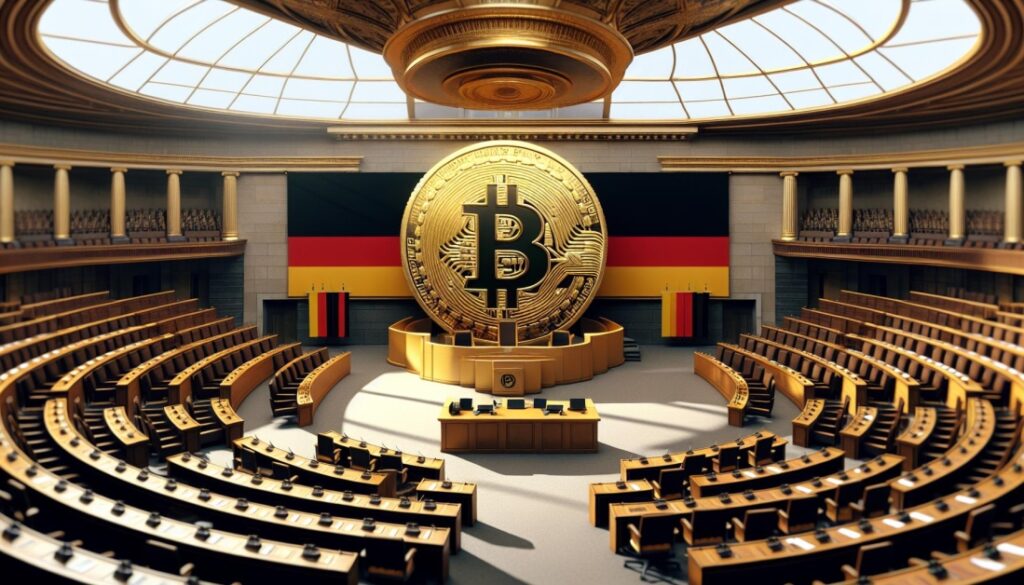Bitcoin in the Bundestag: Germany’s Bold Leap into Cryptocurrency Recognition

In an unexpected move that could change the financial environment, Joana Cotar, a member of the German Bundestag, has put forward the idea of recognizing Bitcoin as legal tender in Germany. This revelation, which came amid a global surge in interest in cryptocurrencies, suggests that Germany could potentially take a leadership role in adopting decentralized digital currencies at the government level. The implications go beyond cryptocurrency and point to a broader shift in economic ideology – one that is consistent with the principles of proactive economic policy.
A Clear Focus on Bitcoin: Shaping a New Financial Narrative
Cotar’s initiative entitled “Bitcoin in the Bundestag” aims not only to integrate Bitcoin into mainstream financial processes, but also to inform parliamentary colleagues about its benefits to clarify. Their exclusive focus on Bitcoin distinguishes their approach and emphasizes the need to establish a formal committee that recognizes Bitcoin’s technological nuances. This move reflects a departure from traditional strategies and is in line with the emerging paradigm of reshaping the economic landscape.
Shaping the future: Germany’s strategic move with the recognition of Bitcoin
The move to recognize Bitcoin as legal tender in Germany goes beyond a legal or financial matter – it is a strategic step towards shaping the future of finance in an evolving economic framework. The principles of this strategic change revolve around building and achieving a concrete vision for the future and not just responding to existing challenges. The German push for Bitcoin is in line with this vision and aims to create a regulatory environment that encourages innovation while addressing potential risks associated with the use of cryptocurrencies.
Data protection, security and adaptability: basic principles of Bitcoin recognition
The recognition of Bitcoin in Germany is not just about legality; It’s about creating the conditions for a future financial landscape. The principles of adaptability, data protection and technological innovation come to the fore. Cotar’s focus on data protection, strict security standards and a regulatory approach to avoid excessive restrictions reflects the core ideas of this strategic move.
Global Impact: The Value and Acceptance of Bitcoin on the World Stage
With Germany at the forefront of recognition Positioned by Bitcoin, the potential impact on its value and adoption could reverberate around the world. Beyond the immediate impact on the cryptocurrency market, this move is consistent with a broader global shift towards a more targeted and proactive approach to economic policy – a defining feature of the evolving economic landscape.
The debate over the digital euro: decentralization and individual freedom
Germany’s move to recognize Bitcoin signals a clear departure from traditional financial norms, but also stimulates thought about the possible correlation with the digital euro. The digital euro, a digital version of the euro proposed by the European Central Bank, was met with both anticipation and skepticism. Cotar’s emphasis on the decentralized nature of Bitcoin and its potential to improve financial freedom raises questions about how the country might balance the coexistence of a government-backed digital currency and a decentralized cryptocurrency.Which regulatory authorities are there for trading? Further information
Positive connections: A synergistic approach
On the positive side, the recognition of Bitcoin could contribute to a more comprehensive understanding of digital currencies in Germany. This could pave the way for constructive discussions about how government-backed digital currencies and decentralized cryptocurrencies can coexist, each offering unique advantages. A synergistic approach could emerge where both forms of digital currencies complement each other, encouraging innovation while maintaining regulatory integrity.
Potential challenges
Conversely, the recognition of Bitcoin could lead to challenges in harmonizing the regulatory landscape with the introduction of the digital euro. Finding a balance between the decentralized nature of Bitcoin and the controlled environment of a government-backed digital currency requires careful consideration. Policymakers may need to manage potential conflicts and create a regulatory framework that takes both into account and ensures the stability of the financial ecosystem.
Conclusion
While Germany is a pioneer in recognizing Bitcoin, it is at a crossroads in shaping the future of digital finance. The connection between this move and the possible introduction of the digital euro underlines the dynamics of the evolving economic paradigm. Whether positive or challenging, these developments represent a departure from traditional economic models and take the financial landscape into new territory.




